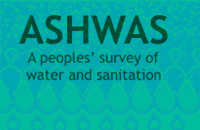/topics/sanitation
Sanitation
Sanitation during wars and emergencies
Posted on 22 Nov, 2014 10:30 AMDuring conflicts and wars, many die as a consequence of bombings and battles. To the death toll, many more zeroes get added in the days and months to follow! Poor hygiene and sanitation takes several hundred lives in the refugee settlements.
Water management by industry: A case study of TATA Chemicals, Mithapur
Posted on 22 Nov, 2014 10:30 AMThis presentation describes the work of Tata Chemicals in organising water management initiatives, with the community around its plant in Mithapur, Gujarat. The various efforts taken up include integrated watershed development, salinity ingress mitigation, Water and Sanitation Management Organisation (WASMO) projects, rooftop rainwater harvesting and implementing water saving technologies.
Water conservation by industry: A case study of Kirloskar Brothers Limited Pune
Posted on 22 Nov, 2014 10:30 AMThe various initiatives taken up include installing sensors/push type tap for hand wash/urinals, close loop hydro testing, installing drip irrigation and sprinklers for garden, installing float valves for old overhead tank, using percolated rain water for process, use of AC condensed water, use of air cooled instead of water cooled compressors, treating waste water and more.
Drinking water from a fresh pit everyday : The life of people in the fishing settlements in Dhanuskodi
Posted on 22 Nov, 2014 10:30 AMIn an earlier post Microfinance for Water - How would it Work? I had put up a picture of a woman drawing water out from a pit.
ASHWAS A peoples survey of water and sanitation in Karnataka 2009
Posted on 22 Nov, 2014 10:30 AM
This report includes the findings of the ASHWAS survey (A Survey of Household Water and Sanitation), a participatory survey carried out by Arghyam, that included 28 districts of Karnataka covering more than 17,200 households across 172 gram panchayats (GPs). This was a peoples' survey, and the surveyors were selected from the respective communities that included students, women from self help groups, local NGO partners and other volunteers.
Sustainable and Ecological Sanitation Experiences
Posted on 22 Nov, 2014 10:30 AMA consultation was organised by Arghyam Trust in September 2009, to share experiences on Sustainable and Ecological Sanitation with the Planning Commission.
Book review :The Big Necessity
Posted on 22 Nov, 2014 10:30 AM
The Big Necessity - The unmentionable world of human waste and why it matters By Rose George
An update on ecosan work in India
Posted on 22 Nov, 2014 10:30 AMPrakash Kumar, an ecological sanitation consultant with UNICEF/Stockholm Institute provides an update on some recent work on ecological sanitation in India:
====
- We are in the process of supporting I I T Delhi for nutrient recovery project for developing complete process for converting liquid urine in to the crystalline form.
- We are in the final stage of supporting SCOPE for demonstration of ecosan toilet in a govt. middle school at Musiri, Trichy.
- Comprehensive evaluation of Tamilnadu ecosan project will be taken up shortly.
- Last batch of training of CCDU officials have been completed . This year total 5 batches got training on ecosan.
Global Handwashing Day for 2009
Posted on 22 Nov, 2014 10:30 AM


WSSCC Member Flash
Periodic updates for WSSCC members on hot and late-breaking topics
Global Handwashing Day Special Edition
The practice of handwashing with soap has been prominent in the last few years on the international hygiene agenda. The second annual Global Handwashing Day takes place on Thursday, 15 October 2009 in countries all over the world, including countries where WSSCC is active through its National WASH Coalitions. The guiding vision of Global Handwashing Day is a local and global culture of handwashing with soap. Although people around the world wash their hands with water, very few wash their hands with soap at critical moments (for example, after using the toilet, while cleaning a child, and before handling food).
Sanitation in the flood affected areas : Biome Solutions
Posted on 22 Nov, 2014 10:30 AMBiome Solutions, a Bangalore-based company working on sustainable architecture and buildings visited some flood affected areas in Guntur to observe the situation and see the suitability of applying "Ecological Sanitation", a new approach to sanitation. (Search on India Water Portal for "Ecological sanitation" for more information on this). Their report after their travels can be seen below.
A point of interest is the picture of a flooded toilet. Pit toilets which are the norm in rural areas have the disadvantage that during floods the pit below the toilet (where the human waste accumulates over time) gets flooded and the toilet becomes unusable. The faecal matter can come out of the toilet pan and create a real mess which needs to be cleaned up.
Read their report at:
http://biomesolutions.blogspot.com/2009/10/visit-to-flood-affected-areas-in-guntur.html





